#Adyghe (people)
Explore tagged Tumblr posts
Text
Circassian Day of Mourning (May 21)
On the day of the end of the Russian-Caucasian war of 1763–1864, on the day of memory and sorrow of the Circassians, we publish another album-manifesto from Jrpjej. In addition to music, the album is accompanied by a pdf-zine with our reflection on Circassian songs of the 20th century and their relevance today “Sefitse” is a line from the song “Quedzoqo Tole Tsiku.” In the Adyghe language, “se”…

View On WordPress
#Adyghe (people)#Bulat Khalilov#Caucasian Knot (website)#Circassian Day of Mourning (May 21)#Circassian folk music#Circassian genocide#Circassians#Jrpjej (folk music group)#Kabardino-Balkaria#Nalchik#Ored Recordings#Russo-Circassian War#Timur Kodzoko
14 notes
·
View notes
Text
I feel like there's a Zoom lecture in me, at least, on Historical Biases I Have To Explain At Length To People Nowadays. to name just a few:
Anti-Quaker sentiment
The fetishization of Adyghe/Cherkess/Circassian women
Opposition to left-handedness
That period when everyone thought lesbians were uptight stuffy prudes (or at least, "unmarried" women who were interested in social issues and intellectual pursuits, many of whom were in fact gay)
148 notes
·
View notes
Text
League of Free Nations: Indigenous activists from Russia to fight for independence from Moscow

Kalmyks in Elista, Republic of Kalmykia. Source: Wikipedia
2022/05/24 - 00:00 • INTERNATIONAL, RUSSIA, RUSSIAN AGGRESSION
Article by: Christine Chraibi
Indigenous activists from Russia, representing six national movements, have announced the creation of the League of Free Nations– a political platform for the decolonization of indigenous peoples in the Russian Federation and the acquisition of each nation’s sovereignty.
With the outbreak of the Russo-Ukrainian war on 24 February, 2022, many Russian citizens of indigenous nations have been wittingly or unwittingly drawn into the ranks of the Russian army. However, most are there because they are trying to escape the horrible poverty they experience at home and see the military as the best or in many cases only way to improve their sorry lives.
Indigenous peoples have been under the Russian yoke for centuries
Back in April 2021, Sires Bolaen (Syres Boliayen), Inyazor (Chief Elder) of the Erzya people, addressed the 20thsession of the UN Permanent Forum on Indigenous Issues, drawing attention to the Kremlin’s policy of purposeful neglect and discrimination of indigenous people.
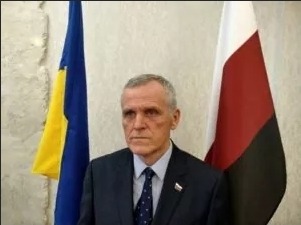
Sires Bolaen (Syres Boliayen), Inyazor (Chief Elder) of the Erzya people. Photo: open source
“Within the past 30 years, the Ezrya have been turned from a nation of a few million people into a small ethnic group on the brink of complete extinction.
Our neighbours in the Idel-Ural region – Mokshans, Udmurts, Maris, Chuvashs, Bashkirs and even Tatarsalso find themselves in a very similar position. Native peoples in Russia are forbidden to have their own political parties, or even to study their mother tongue in secondary schools. Only dancing in national costumes is tolerated. Those who stand up for their rights are persecuted as extremists and become victims of punitive psychiatry.”
The leader of the Erzya national movement is known not only for his anti-imperialist stance, but also for leading a group of Erzya volunteers fighting with the Ukrainian army. He is the co-founder of the Free Idel-Ural movement,which advocates the withdrawal of six Volga republics (Bashkortostan, Tatarstan, Chuvashia, Mordovia, Mary El and Udmurtia) from the Russian Federation and the creation of the Idel-Ural confederation.
In May 2022, Sires Bolaen once again addressed the UN Permanent Forum on Indigenous People during its 21stsession. He publicly condemned and blamed Moscow for turning federal republics and indigenous communities in Russia into socially backward and under-developed regions where local young people seek to escape poverty by joining the Russian Armed Forces.
North Ossetia, Buryatia, Tuva, Dagestan, Ingushetia, Chukotka and Idel-Ural are the regions with the highest number of dead soldiers per thousand population, he says.
Indigenous peoples gather in the League of Free Nations
In order to draw attention to the dire situation facing the indigenous people of Russia,Bashkir, Buryat, Ingush, Kalmyk, Erzya and Adyghe activistsdecided to set up a new organization – the League of Free Nations – and proceeded to issue a public announcement.
“These past few weeks, various media have been writing and talking more about the future of the Russian Federation after the Russian-Ukrainian war.
First of all, these discussions do not concern the organization of the federal subjects of the Russian Federation, but look more towards the paradigm ‘the future of the federal center is the future of Russia’.”reads the statement.
Vladimir Dovdanov, member of the Oirat-Kalmyk People’s Congressunderlines that his people have been experiencing colossal demographic catastrophes for centuries.

Vladimir Dovdanov, member of the Oirat-Kalmyk People’s Congress. Photo: Idel Realii (RFE/RL)
“…This is due to the fact that we’ve always been treated as a colony ruled by a tsar. Later [during the Soviet period-Ed], the different general secretaries used the Kalmyksas disposable objects. Today, as a result of Russia’s military aggression against Ukraine, major global political changes are taking place, and this gives us the opportunity to become a subject state, and no longer be treated as an object. I see that many other peoples in the Russian Federation have the same desire.”
In their manifesto, the indigenous leaders proclaim the principle of “presumption of subjectivity/agency”, according to which the regions do not need to appeal to anyone to grant them sovereignty in the event of the collapse of the current political regime in the Russian Federation,.
All regions, by definition, can achieve and declare full sovereignty and full independence from Moscow. Then, acting as free territories, they can decide their own future: whether they want to remain independent, unite with other regions/republics, or create a confederation of states.
Sires Bolaen, Inyazor (Chief Elder) of the Erzya peopleassures that the League of Free Nations is open to new members and invites all those who share anti-imperialist views and recognize the right of peoples to self-determination to join the organization.
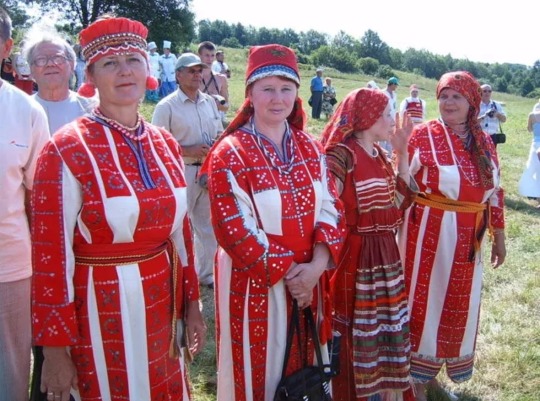
Erzya women from Penza Oblast dressed in traditional clothes. Source: Wikipedia
Activists of the Buryat national movement Dorjo Dugarov and Rajana Dugar-De Ponte, who co-founded the platform, believe that uniting different national movements around the struggle for freedom and political subjectivity will have a cumulative effect – in particular, open new opportunities for the members to convey their ideas on different international platforms.
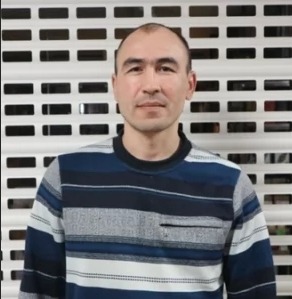
Activist Ruslan Gabbasov from Russia’s Republic of Bashkortostan. Photo: Idel Realii
Activist Ruslan Gabbasov from Russia’s Republic of Bashkortostan, who fled Russia in December 2021 fearing for his safety and obtained political asylum in Lithuania, is a representative of the Bashkir national movement.
“I believe that all constituent subjects, as well as all indigenous peoples of the Russian Federation have the right to participate in the discussion on the future of Russian territories and to exercise their right to self-determination,”said Gabbasov .
The initiators of the League of Free Nations are as follows:
Vladimir Dovdanov, Batyr Bormongaev, Erenzen Doliaev(Kalmyks, Republic of Ralmykia)
Ruslan Gabbasov(Bashkir, Republic of Bashkortostan)
Sires Bolen and Vitaliy Romashkin(Erzyas, one of the peoples of the Republic of Mordovia)
Dorjo Dugarov, Rajana Dugar-De Ponte(Buryats, Republic of Buryatia)
Today, the members of the League of Free Nations call for the establishment of direct contacts with European, Turkish and Kazakh public organizations and political parties.
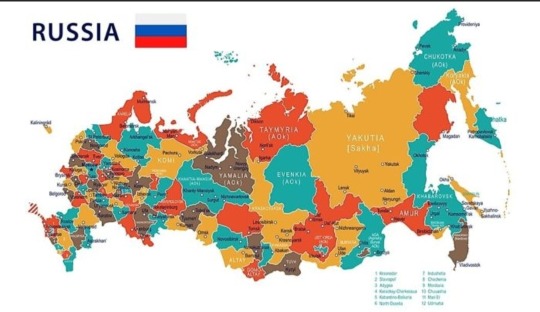
Administrative mao of the Russian Federation. Photo: World Atlas
Editor’s Note
Background
According to its constitution, the Russian Federation is divided into 85 federal subjects, 22 of which are republics. Republics are administrative divisions originally created as nation states to represent areas of non-Russian ethnicity. The indigenous ethnic group that gives its name to the republic is referred to as the titular nationality. However, due to decades of Russian migration, each nationality is not necessarily a majority of a republic’s population.
During his long years in power, Vladimir Putin has launched several centralization reforms which steadily eradicated all autonomy the republics had, with the exception of Chechnya. All bilateral agreements were abolished and in practice all power rests with the central federal government.
In fact, some experts believe that Russia has ceased to be a federation.
#indigenous#culture#indigenous russia#indigenous russian#russia#important#fypシ#colonization#fypage#landback#siberian indigenous#indigenous siberian#siberian#siberia#indigenous rights#indigenous people#freenations#League of Free Nations#russian imperialism
73 notes
·
View notes
Text

Adyghe people traditional costume (Circassian men, women)
10 notes
·
View notes
Note
What *are* some crazy linguistics facts? The ones for which pretending it's just a normal feature of a language is coping?
Well there are some rare linguistic features, like for instance (claimed) presence of a voiceless bidental fricative in some dialects of Adyghe or the (claimed) OVS word order of Hixkaryana, but many of these are (1) actually somewhat complex or ambiguous in their attestation, and (2) only "crazy" to linguists who already know that they're rare. Like a priori there's no reason that a bidental fricative is crazy other than that is in fact very rare.
There are other things too, you know, sometimes a language will demonstrate some really ridiculous series of historical sound changes or something. But these are often even higher-context in their "craziness".
Language is frankly sort of boring unless you are a little bit autistic about it. People want to draw many social or philosophical or whatever conclusions from it, but the reality is that most facts about particular languages are incidental historical accidents with no broader implications (or, broader implications that come only in the form of providing evidence for ancient population movements or hinting at as-yet-indecipherable and therefore useless arcana of the human mind). But if you're into it it's really fun to learn about all the little intricacies. Gunpla type of academic field.
47 notes
·
View notes
Text
i just checked my adyghe tag and remembered just how much i hate ARA interactions bc they would weaponize the concept of being indigenous so that non-indigenous people were fair game in their you-can't-eat-meat arguments.
#there was one particular nutcase that was bothering me bc she kept throwing whole ass masterposts at any line i would share#she would always include that blood quantum stuff to invalidate indigenous people saying its ok to eat meat
2 notes
·
View notes
Note
Likewise.
Hence why I plan on learning Syriac.
Like I said.
Outside of the Assyrian communities very few people speak it, aside from maybe some Maronites and some Indian Syriac Christians in Kerala.
Plus I figure I may as well learn something what with me being an Irishman what can’t speak Irish.
In addition to Syriac I also have plans to learn Armenian.
And perhaps even Navajo, Basque, Chuvash, Georgian and Adyghe (a Circassian language). Hypothetically…
My dream is to learn a million languages but I really doubt that’ll happen. I’m gonna try to get Hebrew down and after that I think I can get Arabic. Idk what other Semitic languages there are but I can probably get then. Idk what after that if anything.
I should’ve started with Spanish or something but I’m Ashkenazi Jewish so I have more cultural connection to Hebrew. Also considering languages from my European heritage (German, Russian, Ukrainian, Polish, Yiddish) but idk.
I also have a friend who’s Armenian, which is neat. We’ve only talked about that once tho and I probably don’t want to push her on that.
6 notes
·
View notes
Text
Seven Snippets Seven People Tag
Thanks for tagging me, @talesfromaurea! :D
Here are seven snippets from the denouement of The Unfortunate Moth (major spoilers, obviously):
1.
"Are you telling me that a professional killer was hired to murder Mrs. Langdale?" the doctor asked.
Yo-han nodded. "I know, it sounds improbable. But there are certain important facts that prove it. First, the similarity in the murder weapon and the way the murder was committed."
Tremaine ventured to say, "That ain't proof, though."
"Not on its own. Second, the assassin's apparent invisibility. Third, the music."
"Hey!" Tremaine yelped. "Are you tryin' to pin this on me?"
Yo-han took a deep breath and forced himself to remain polite. "Not at all, I assure you. I simply mean the assassin was familiar with the piece of music and knew when it would be loud enough to cover a shot.
"Fourth, where did the money go? Obviously the assassin has expensive tastes, or is spectacularly careless. I doubt he gave it all to charity. Could he, perhaps, have lost most of it in gambling?"
Under cover of surveying all of the suspects, Yo-han kept a close eye on one of them in particular. Now for the first time he saw a flicker of alarm beneath the mask.
"Fifth, the hole in the wall.
"Sixth, he cannot have regular employment or he would never be able to travel the world like this. Yet he can't be completely reliant on the money he earns from killing, or the irregularity in his finances would have been discovered before now.
"In short, we have a murderer with a fondness for gambling, a knowledge of disguise, music, and carpentry, and no steady job. That description would fit an actor very well. Don't you agree, Mr. Colman?"
2.
If Yo-han had thrown a bomb at the gathered suspects he could hardly have caused more uproar. Tremaine and the doctor jumped as if they'd been stung. The captain dropped his pipe. The guards looked back and forth from Yo-han to Colman. Király leapt to his feet with an expression that suggested someone was about to get punched, and he hadn't decided yet if it was Colman or Yo-han. Miss Patton turned to Colman with a bewildered frown.
Colman himself returned Yo-han's stare without flinching and without any apparent emotion. He said nothing, simply raised one eyebrow and waited. His face was blank but there was something in his eyes that suggested he wanted to smile sardonically.
3.
An officer was waiting outside as he had asked. Yo-han took the box from him and went back to his chair. The officer locked the door again. Colman watched with his head on one side and a mildly puzzled expression. Everyone else looked bewildered. Király had sunk back down into his chair, but looked like he was ready to leap up again at a minute's notice.
"Do you recognise this?" Yo-han asked.
"Certainly," Colman said. "It's my violin case."
A chorus of indignant exclamations interrupted here. "That's not a violin case!" "Do you take us all for fools?" "Violin? Yeah, and I'm the Emperor of Mexico."
4.
"I admit, I gamble far too much," Colman said. "But I am quite capable of making money through acting or music. I don't need to go around killing people."
Yo-han ignored him and lifted the violin out. He set it carefully on the table. "Thank you, Mr. Király. Your suitcase gave me an important clue." He ran his fingers along the velvet lining that framed the space for the violin. "All of you can see this case is far larger than it needs to be. What is all that extra space used for?"
One corner moved when he touched it. Yo-han prised it up. The velvet lining came away. A chorus of gasps followed.
A gun lay in pieces in the hidden compartment.
Colman didn't react with anger or despair or even the slightest hint of embarrassment. He sighed and nodded as if he wasn't really surprised. His voice was quite calm as he asked, "What gave me away?"
"When Miss Patton asked what Adyghe is, you said it's a language similar to Russian. You claimed you only speak English, yet you have heard of an extremely obscure language and know where it's spoken. That made me think. I had already deduced Jughashvili's killer must have been good at disguises, so who better than an actor?"
5.
Yo-han continued, "Then of course you showed me your drawings. They made me realise you were interested in set design, which would include some knowledge of carpentry. Enough to know where to saw through a wall without hitting the wiring or pipes, perhaps.
"Any remaining doubt was destroyed when you sent Miss Patton that drawing this morning. I consulted a dictionary of flower meanings. Lilies of the valley, tulips, orchids and hyacinths have one thing in common: they all mean regret. When used in a bouquet they mean the giver is apologising for something."
Colman winced. He turned to stare almost wildly at Miss Patton. "I never meant to put the blame on you. I thought you'd have an alibi. I was an idiot but I didn't deliberately frame you. Everything I've told you is true. I do think of you as a friend. Believe that if you believe nothing else."
Miss Patton stared at him. Her lip trembled and she clenched and unclenched her hands. She raised one hand sharply, but let it drop without striking him. Abruptly she got up and walked over to the other side of the room. She leant on the windowsill and stared out at the sea. Colman watched her, then slumped back against the settee. He looked genuinely distraught as he stared at the floor.
It occurred to Yo-han that the man was more upset about losing a friend than about murdering two people.
6.
Colman shrugged. He looked up and gave Yo-han a sarcastic smile. "No cell will hold me. I'll walk off this ship and you will never stop me."
"Believe that if it gives you comfort," Yo-han said dryly.
7.
Yo-han had brought his luggage off the ship and was waiting near the passport check-point to meet Miss Patton and Mr. Király when they disembarked. He idly watched the passengers milling by. Some he recognised, some he knew by sight only, some he didn't know at all. One mousy, non-descript young man brushed past him.
"Good day, Mr. Seo," the man said.
Yo-han returned the greeting automatically. The man had passed him and was showing his passport to the officials before his words — and more importantly his voice — registered.
Yo-han's head snapped round. He was just in time to see the man walk through the gate. He stopped and looked back. There was nothing particularly memorable about him, any more than about the dozens of similar young men all around. Then he straightened up and tilted his head to the side. Even from a distance Yo-han could see he was grinning.
Leopold Colman waved cheerily and disappeared into the crowd.
Yo-han started forward. He opened his mouth. The words to alert the officers were on the tip of his tongue. Then he closed it again. Colman was long gone.
Tagging @diphthongsfordays, @enchanted-lightning-aes, @eccaiia, @blind-the-winds, @fearofahumanplanet, and anyone else who wants to do this! :D
5 notes
·
View notes
Text
Ored Recordings: May 21st, Again (Abkhazian and Circassian Music from Turkey)
May 21st. Again. For several years now, almost every May 21st, we release a statement that speaks more clearly about memory, colonialism, defiance against repressive mechanisms, and resistance to assimilation. For the Circassians, this day is a day of mourning, marking the end of the Russo-Caucasian War in 1864, the loss of independence, and the mass expulsion from their historical…
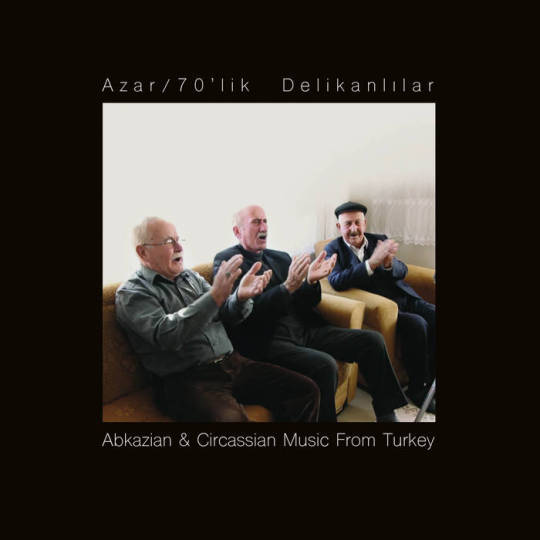
View On WordPress
#Abkhazia#Abkhazians#Adyghe (people)#Circassian Day of Mourning (May 21)#Circassian diaspora#Circassian folk music#Circassian genocide#North Caucasus#Ored Recordings#Russo-Circassian War#Timur Kodzoko
0 notes
Text




Circassian people
23 notes
·
View notes
Text
White xaldos will be like indigenous people exist in europe too!!! Like ummm.... the irish???
If u live in europe i promise you there is at least one group that lives in some part of your country that has had their land taken from them. They are probably a small group and they are probably not so well known outside of the region. Not everything falls into your lap. Sometimes you have to actually make an effort to learn about the land you live on
#i keep seeing the shortest lists of european indigenous peoples#like. where are the sarakatsani? the adyghe? the vaqueiros?#there are so many tiny nomadic pastoralist ethnic groups in mountainous areas as well#indigenous peoples facing internal colonialism flee there for the defensive terrain
8 notes
·
View notes
Text
CAUCASUS & IRANIAN RESOURCES
The Anthropological Masterlist is HERE.
The Caucasus, or Caucasia, is a region that serves as a barrier between East Europe and West Asia.
ARMENIA ─ “The Armenian people are a West Asian people. They are native to the Armenian Highlands.” ─ Armenian Literature ─ Armenian History ─ Armenian Dictionary
AZERBAIJAN ─ “The Azerbaijani, or Azeri, people are a Caucasian and Turkic people. They are native to the Republic of Azerbaijan and northwestern Iran.” ─ Azerbaijani Culture ─ Azerbaijani Literature ─ Azerbaijani History
CIRCASSIA ─ “The Circassians, or the Adyghe, are a Caucasian people. They are native to Circassia in the North Caucasus.” ─ Circassian Information ─ Circassian Dictionary (Pages 229 - 430) ─ Circassian Re-Immigration to the Caucasus
GEORGIA ─ “The Georgians, or Kartvelians, are a Caucasian people. They are native to Georgia and the southern Caucasus.” ─ Georgian Culture (in German) ─ Georgian Mythology ─ Georgian Dictionary (in Georgian)
URARTU ─ “Urartu, or the Kingdom of Van, was a West Asian civilization that lived from 860 B.C.E. to 590 B.C.E. They lived in the Armenian Highlands.” ─ Urartian Information ─ Urartian History
VAINAKH ─ “The Vainakh, or Nakh, people are a Caucasian people. They are native to the North Caucasus.” ─ Ingush Information ─ Nakh Language
Iran is a West Asian country that is bordered by Iraq and Turkey. It is home to some of the oldest civilizations and most prolific cultures.
INDO-IRAN ─ “The Indo-Iranian, or Aryan, people are an Indo-European people. They are native to Western Asia and eastern Anatolia.” ─ Indo-Iranian Mythology ─ Indo-Iranian Dictionary
OSSETIA ─ “The Ossetians, or Ossetes, are an Iranian people. They are native to Ossetia.” ─ Ossetian Information ─ Ossetian Language (in Russian)
PERSIA ─ “The Persian people are an Iranian people. They are native to Iran.” ─ Iranian Culture ─ Persian Literature ─ Persian Dictionary
SCYTHIA ─ “The Scythian people were a nomadic Iranian people that lived from the 7th century B.C.E. to the 3rd century B.C.E. They lived in Ukraine and southern Russia.” ─ Scythians and the Achaemenid Empire ─ Origin of the Scythians Myth
YAZIDI ─ “Yazidism, or Sharfadin, is an Iranian religion. It originates in Kurdistan.” ─ Yazidi Information ─ Yazidi Culture ─ The Yazidi Black Book
ZOROASTRIANISM ─ “Zoroastrianism is a Persian religion. It originates in Iran.” ─ Zoroastrian Information ─ Zoroaster Information ─ Avesta
#resources#caucasus#iran#armenia#azerbaijan#circassia#georgia#urartu#vainakh#indo-iran#ossetia#permanent slave#scythia#yazidi#zoroastrianism
163 notes
·
View notes
Text
Langblr culture challenge
Day 12: Religion
Russia is a secular state and has the largest Orthodox population in the world. According to a 2017 survey, 73% of Russians identified as Christians, out of which 71% were Orthodox, 1% were Catholic, and 2% belonged to other denominations. 15% were unaffiliated, 10% were Muslims, and 1% followed other religions.

Islam is the traditional religion of some Caucasian ethnic groups (the Chechens, the Ingush, and the Adyghe) and some Turkic peoples (the Tatars and the Bashkir) and the majority religion in Chechnya and Ingushetia.
Buryatia, Kalmykia, Tuva, and Zabaykalsky Krai have sizable Buddhist populations.
The proportion of atheists in Russia ranges between 16% and 48% of the population.

17 notes
·
View notes
Text
dunno about other indigenous folks, but recently i've been talking to more of our adyghe youth and it became clear that many dont want outsiders to know all that much about us actually. We just want to connect amongst ourselves and it results in somewhat exclusionary behaviour (there is a whole conversation to be had about this actually, but that would be too much for this post). I mentioned this video a youtube history channel made about us and it was met with :/ faces.
Makes me curious about how the youth of other indigenous people view stuff like that.
#any input is welcome!#indigenous#adyghe#circassian#day of mourning bc of the genocide is in may and the last time i made a post about it i actually felt a bit odd posting about it#on one hand educating about it is important#on the other hand the life of our tribes is such an intimate thing too#so it felt oddly vulnerable to talk about it and i tried to keep it on a somewhat surface level#still felt like i made a mistake by just talking about it online lmao but those are my complicated feelings to deal with#anway#i am insanely curious how other indigenous folks feel about this#staying amongst your own to such a degree that just outsiders getting educated about your tribe feels uncomfortable
12 notes
·
View notes
Text
#АдыгэИлъэсыщ1э! 🌸🌱���🌳🌷🌞
#ИлъэсыкIэмкIэСыпфэгушIо! ☀️
#ИлъэсыкIэмкIэСышъуфэгушIо! ☀️
Happy New Year! 🌖
#HappyCircassianNewYear! 🌸
🎊🎉 Year 6231🎉🎊
The celebrations will start on March 21st/22nd and will last for three days.
Link:



The Circassian Celebration of the New Year
The Circassian calendar was closely connected to the sun and its activities. Ancient Circassians, just like many agricultural peoples, lived by seasons, not by years. They used to celebrate each of the two equinoctial points, as well as both solstices (the Summer and the Winter Solstice). The Spring Equinox (гъэрэ щlырэ зыхокl) was one of the most important seasons of the year. Traditionally, a sacrificial chicken (along with many other dishes) was cooked for the family and guests. The holiday is also referred to as a “sacrifice to the hearth” (маф1эщхьэ тыхь) or a sacrificial chicken (маф1эщхьэ джэд). Also, eggs had a special significance. An egg was a symbol of the Spring and the beginning of a new life. After celebrating the New Year (the Spring Equinox), Circassians did not use eggs in cooking until the laying hens hatched the first chickens. Therefore, on this day, all stocks of eggs were used.
At the beginning of the celebration, an egg was set on a pole and shot at with a bow marking thus symbolically the beginning of a new life cycle. Traditional toasts included the following well-wishing words: May everyone arrive to the next season in good health and spirits, or May God see us through next year!
Ет1энэгъэ п1алъэ Тхьэм псори узыншэу дынигъэс!
March 22, 2022 is said to mark year 6231 on the Circassian (Adyghe) calendar. Sadly, the Russian colonization of Circassia in the 19th century has nearly destroyed the Circassian world. Later on, the Soviets have imposed their own holidays on those Circassians who managed to survive and stayed in their homeland and many traditional practices and holidays have been erased and nearly forgotten. Lately, however Circassians are making efforts to recall these traditions as a way of reconnecting to their past and reestablishing their identities.
1 note
·
View note
Photo
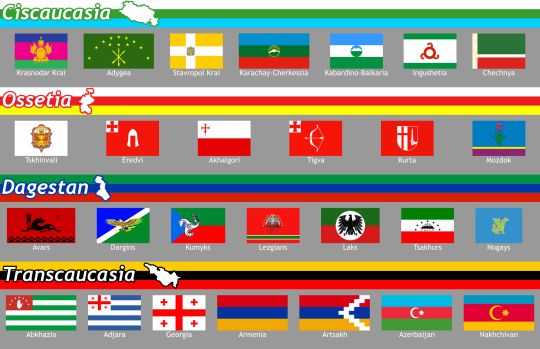
The Caucasus has some pretty cool flags, doesn't it? (Explanations in comments)
from /r/vexillology Top comment: **A few things I wanted to note first:** - It was probably dumb of me to list Ossetia and Dagestan separately from the rest of the Caucasus. Dagestan is very much Ciscaucasian, Ossetia is split between Cis- and Transcaucasia. - The surrogate tricolor used for Ciscaucasia is one which according to an unreliable-looking Italian vex site was used by the MRNC shortly before they adopted their more well-known American-style flag. - The surrogate tricolor used for Transcaucasia is the one used by the short-lived Transcaucasian Democratic Federative Republic. - I've vaguely heard that the names Cis- and Transcaucasia are disliked by Caucasians. If you're Caucasian and the names offend you, then sorry. I just didn't want to use longer names than necessary. - The listing of a flag here doesn't guarantee its official or unofficial use. So, think of these more as *some* flags *for* rather than *the* flags *of*. - Please don't talk about whether or not Abkhazia, South Ossetia, and Artsakh should or shouldn't be recognized. - Abkhazia is sometimes considered part of Ciscaucasia for cultural and linguistic reasons, although it is geographically Transcaucasian. - I used the Georgian name of Akhalgori/Leningor because that's what Wikipedia uses. - There are tons of really cool ethnic and city flags which I didn't list, plus some more Southern Russian flags which may or may not be Ciscaucasian depending on your definition. - There are also tons of really cool emblems and anthems you might want to check out. - Sorry if some of the pictures are a bit low-quality. Now, time to quickly explain these flags. **Please correct any mistakes.** I'm sure there's at least one. **Ciscaucasia:** - Krasnodar Krai's flag is the Kuban People's Republic's defaced with a golden version of the krai's coat of arms. Said coat of arms is heavily based on the one used by Kuban Oblast in Imperial times. - Adygea's flag is the same as the flag of Circassia. Green is nature and Islam, yellow is wheat, nine stars in the arc are the aristocratic tribes of Circassia, three horizontal stars are the democratic tribes, and the three arrows represent unity between the original princely families of Circassia. - Stavropol Krai's flag has a yellow field to represent sunshine and agriculture, and a pure white cross to reference the name (from "Stauropolis", Greek for "City of the Cross"). The cross also represents Stavropol Krai as "crossroads" between Europe and Asia, and Russia and the Caucasus. - Karachay-Cherkessia's flag is unofficially said to have sky blue for Turks, green for Adyghes, and red for Slavs. The central emblem represents the beauty of the Caucasus. - Kabardino-Balkaria's flag features a representation of Mt. Elbrus, which is located there. I think I read somewhere that the blue represents the Turkic Balkars, green the Adyghe Kabardians, and white the peace between them, but I'm not sure where. - Ingushetia's flag has green for Islam, white for purity, and red for the struggle against injustice. I do have to wonder if the colors are related to the Ichkerian flag. In the middle is a traditional solar sign, with three rays for the oneness of past, present, and future. - Chechnya's flag uses the Chechen colors, also found on the Ichkerian flag often used in its place. Green is Islam, red is bloody history, white is peace and the mountains. At the hoist is a traditional ornamental pattern. **Ossetia:** - Tskhinvali's flag shows the city emblem on a white field. This emblem features Ossetian colors, three towers, a sunrise, the name, the key to the city, the Nartamonga bowl from Ossetian mythology, and an Aryan symbol of harmony and perpetual motion with a 12-string harp. - Eredvi, Akhalgori, Tigva, and Kurta's flags are similar to their respective coats of arms. The flags and arms were designed by heraldists of the Georgian government, using patriotic Georgian motifs. I couldn't find any further information. Interestingly, Eredvi and Kurta are abandoned. - Mozdok is the only city in North Ossetia with a flag of its own. It's based on the coat of arms, itself based on the Imperial-era arms, with additional stripes at the bottom. I couldn't find the significance of the saffron flower. **Dagestan:** - This Avar flag features stylized mountains, a Hunnic wolf, a crescent moon, and a banner with an ancient Avar swastika symbol. This is based on the symbol of the historical Avarian Khanate. Variants change the colors or drop the mountains. - This Dargin flag is officially the flag of Dakhadayevsky Raion, where many Dargins live. The eagle with a traditional Caucasian dagger represents the Caucasian man, master of the mountains, striving upwards towards wisdom and spiritual perfection. - This Kumyk flag has blue, green, and a star and crescent for Turkic heritage and Islam, and red for the "national self-image". The triskele represents the eternal cycle of being in Tengrism. The horse is the Kumyk's eternal companion, the wolf represents freedom, and Umai-Ana is the ancestress and patroness of the Kumyks. - Lezgians use many similar flags. Sometimes it's simple stripes, sometimes it has "ALPAN" (Lezgian for "Caucasian Albania") written in Caucasian Albanian letters, sometimes an emblem with an eagle and stars, sometimes both, sometimes other variations still. Red is bloody history, white is peace, green is Islam. - This Lak flag has a stylized mountain range and a picture of an eagle. I can only imagine the meaning is similar to those in other flags with similar elements. - This Tsakhur flag depicts the mountains, with seven stars for the seven countries Tsakhurs have been under throughout history. "TSAKHUR" is written in Caucasian Albanian letters. Green is Islam, white is Tsakhur scientists, and red represents a bloody history. - This Nogay/Nogai flag has a winged she-wolf to represent the Ashina tribe, the ancient leaders of the Turks. The colors presumably also represent Nogays' Turkic heritage. **Transcaucasia:** - The flag of Abkhazia combines elements of the flag of the MRNC, of which it was part, and the flag of "Sevastopol" in the Book of All Kingdoms, which is believed to have represented what is now known as Sukhumi. The stars represent the historical regions of Abkhazia, and the stripes represent the peaceful co-existence of Christianity and Islam. 7 is a sacred number to the Abkhaz. - Adjara's flag depicts the national flag of Georgia, with blue for the Black Sea. The seven stripes presumably represent the two cities and five districts of Adjara. - Georgia's flag originated in the Middle Ages and was adopted in 2004. It features St. George's Cross and four Georgian Bolnisi crosses. One explanation of the meaning is that it represents the Five Holy Wounds. - The flag of Armenia was based on a flag of the Lusignan Dynasty, but with the charges removed and yellow swapped for orange. Among other things, the red represents the Armenian Highland, blue the will to live under peaceful skies, and orange creativity and good work ethic. - The flag of Artsakh is an Armenian flag defaced by a zig-zag pattern used in local carpet designs. This defacement also creates the image of a smaller Armenian flag separated from the rest. - The flag of Azerbaijan has sky blue for Turkic heritage, red for modernity, and green for Islam. The star and crescent is also a symbol associated with Islam and Turks. The eight points may represent the letters of "Azerbaijan" when written in Arabic, or the different Turkic peoples of Azerbaijan. - This flag of Nakhchivan was never official. It was reported in protests in the '90s, although in reality it was just a variant of the national flag. Nevertheless, it's still occasionally used to represent Nakhchivan.
23 notes
·
View notes